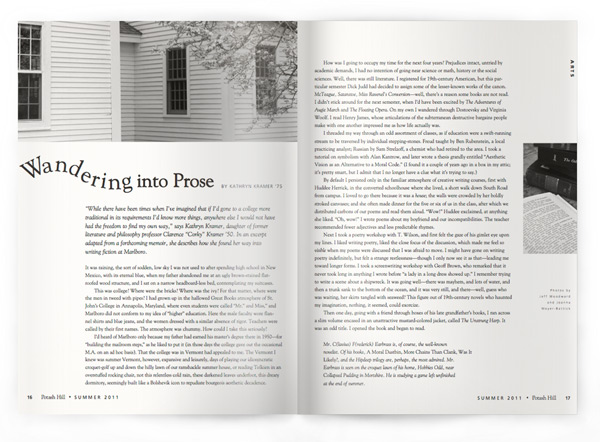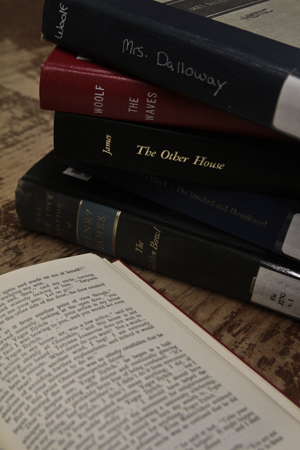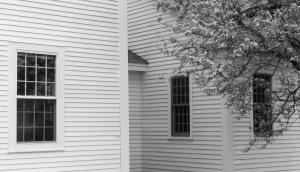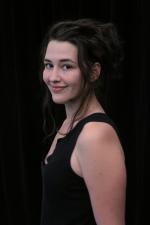Wandering into Prose

by Kathryn Kramer ‘75
“While there have been times when I’ve imagined that if I’d gone to a college more traditional in its requirements I’d know more things, anywhere else I would not have had the freedom to find my own way,” says Kathryn Kramer, daughter of former literature and philosophy professor Clarence “Corky” Kramer ’50. In an excerpt adapted from a forthcoming memoir, she describes how she found her way into writing fiction at Marlboro.
It was raining, the sort of sodden, low sky I was not used to after spending high school in New Mexico, with its eternal blue, when my father abandoned me at an ugly brown-stained flat-roofed wood structure, and I sat on a narrow headboard-less bed, contemplating my suitcases.
This was college? Where were the bricks? Where was the ivy? For that matter, where were the men in tweed with pipes? I had grown up in the hallowed Great Books atmosphere of St. John’s College in Annapolis, Maryland, where even students were called “Mr.” and Miss,” and Marlboro did not conform to my idea of “higher” education. Here the male faculty wore flannel shirts and blue jeans, and the women dressed with a similar absence of rigor. Teachers were called by their first names. The atmosphere was chummy. How could I take this seriously?

I’d heard of Marlboro only because my father had earned his master’s degree there in 1950—for “building the mailroom steps,” as he liked to put it (in those days the college gave out the occasional M.A. on an ad hoc basis). That the college was in Vermont had appealed to me. The Vermont I knew was summer Vermont, however, expansive and leisurely, days of playing our idiosyncratic croquet-golf up and down the hilly lawn of our ramshackle summer house, or reading Tolkien in an overstuffed rocking chair, not this relentless cold rain, these darkened leaves underfoot, this dreary dormitory, seemingly built like a Bolshevik icon to repudiate bourgeois aesthetic decadence.
How was I going to occupy my time for the next four years? Prejudices intact, untried by academic demands, I had no intention of going near science or math, history or the social sciences. Well, there was still literature. I registered for 19th-century American, but this particular semester Dick Judd had decided to assign some of the lesser-known works of the canon. McTeague, Satanstoe, Miss Ravenel’s Conversion—well, there’s a reason some books are not read. I didn’t stick around for the next semester, when I’d have been excited by The Adventures of Augie March and The Floating Opera. On my own I wandered through Dostoevsky and Virginia Woolf. I read Henry James, whose articulations of the subterranean destructive bargains people make with one another impressed me as how life actually was.
I threaded my way through an odd assortment of classes, as if education were a swift-running stream to be traversed by individual stepping-stones. Freud taught by Ben Rubenstein, a local practicing analyst; Russian by Sam Strelzoff, a chemist who had retired to the area. I took a tutorial on symbolism with Alan Kantrow, and later wrote a thesis grandly entitled “Aesthetic Vision as an Alternative to a Moral Code.” (I found it a couple of years ago in a box in my attic; it’s pretty smart, but I admit that I no longer have a clue what it’s trying to say.)
By default I persisted only in the familiar atmosphere of creative writing courses, first with Huddee Herrick, in the converted schoolhouse where she lived, a short walk down South Road from campus. I loved to go there because it was a house; the walls were crowded by her boldly stroked canvases; and she often made dinner for the five or six of us in the class, after which we distributed carbons of our poems and read them aloud. “Wow!” Huddee exclaimed, at anything she liked. “Oh, wow!” I wrote poems about my boyfriend and our incompatibilities. The teacher recommended fewer adjectives and less predictable rhymes.
Next I took a poetry workshop with T. Wilson, and first felt the gaze of his gimlet eye upon my lines. I liked writing poetry, liked the close focus of the discussion, which made me feel so visible when my poems were discussed that I was afraid to move. I might have gone on writing poetry indefinitely, but felt a strange restlessness—though I only now see it as that—leading me toward longer forms. I took a screenwriting workshop with Geoff Brown, who remarked that it never took long in anything I wrote before “a lady in a long dress showed up.” I remember trying to write a scene about a shipwreck. It was going well—there was mayhem, and lots of water, and then a trunk sank to the bottom of the ocean, and it was very still, and there—well, guess who was waiting, her skirts tangled with seaweed? This figure out of 19th-century novels who haunted my imagination, nothing, it seemed, could exorcize.
 Then one day, going with a friend through boxes of his late grandfather’s books, I ran across a slim volume encased in an unattractive mustard-colored jacket, called The Unstrung Harp. It was an odd title. I opened the book and began to read.
Then one day, going with a friend through boxes of his late grandfather’s books, I ran across a slim volume encased in an unattractive mustard-colored jacket, called The Unstrung Harp. It was an odd title. I opened the book and began to read.
Mr. C(lavius) F(rederick) Earbrass is, of course, the well-known novelist. Of his books, A Moral Dustbin, More Chains Than Clank, Was It Likely?, and the Hipdeep trilogy are, perhaps, the most admired. Mr. Earbrass is seen on the croquet lawn of his home, Hobbies Odd, near Collapsed Pudding in Mortshire. He is studying a game left unfinished at the end of summer.
A man with a horizontal football-shaped head and bushy mustaches peers with bafflement at the world. Mr. Earbrass is a writer, and his inveterate reluctance about everything, his perplexed participation in a world that misunderstands—this I recognized too. A writer’s life. I’d never read a description of one before.
Mr. Earbrass has rashly been skimming through the early chapters, which he has not looked at for months, and now sees TUH for what it is. Dreadful, dreadful, DREADFUL. He must be mad to go on enduring the unexquisite agony of writing when it all turns out drivel. Mad. Why didn’t he become a spy? How does one become one? He will burn the MS. Why is there no fire? Why aren’t there the makings of one? How did he get in the unused room on the third floor?
On I read: amazed, entertained, exhilarated. Accompanied. An afternoon not long after this I was taking a walk when a voice began to speak. I stopped walking and studied a stone wall in order better to listen to what was going on, seemingly distinct from me, in my mind.
“Edward was languishing next to the grape arbor,” I heard, “when suddenly it dawned on him; he could just as well think she’d died (though for his Lucia to do something so distinct!)—well, she had wilted. Certainly he should have known when she laughed at his ideas about islands….”
Lines of poems had used to arrive like that, but they had always been about me. Poetry I had used as a cri de coeur, a snapshot, an affirmation of self, but this was different. It felt different. I felt different, writing it. It was about someone else.
Inspired by the author of The Unstrung Harp, Edward Gorey, I had begun to discover a way out of anachronism. At the time I would no more have permitted an automobile or Saran Wrap into my prose than I would have gone streaking through the dining hall (an event so common that sometimes people no longer even looked up from their lunch when naked persons went screeching past the tables). I could use words like “asylum” or “embonpoint” and inhabit the world they constituted—just not quite.
The Mourning Dove (the decorous title of the novel I wrote for my senior Plan) owed a substantial debt not only to Edward Gorey, but to Henry James and Virginia Woolf. A Lambert Strether–like character, my poor protagonist deserved to be deceived by the woman he loved because he didn’t get it. He was the dupe. He had pulled the wool over his own eyes, so why shouldn’t others conspire with him against himself? This I evidently thought to be just. It would take me a long time to locate the source of my fascination with this archetypally dimwitted romantic—a complicated journey that would lead me back through the literature of my childhood—but I was experiencing the heady sense of participating for the first time in an ongoing conversation that really mattered to me.
 By now I lived for the hour each week when I sat with T. in his office in Dalrymple, and he questioned me about the chapters I’d given him. Would X really do that? Why is Y so unkind to Z? Why this word instead of that? Why the scene in which poor Edward stands by the rhododendrons here and not later? I’d made these things up, but someone else felt proprietary about them. To write thinking of one thing only to discover that I’d made another, which I could then revise and adjust, the better to approximate…it—I could have sat from dawn till dusk listening to T. talk about my manuscript.
By now I lived for the hour each week when I sat with T. in his office in Dalrymple, and he questioned me about the chapters I’d given him. Would X really do that? Why is Y so unkind to Z? Why this word instead of that? Why the scene in which poor Edward stands by the rhododendrons here and not later? I’d made these things up, but someone else felt proprietary about them. To write thinking of one thing only to discover that I’d made another, which I could then revise and adjust, the better to approximate…it—I could have sat from dawn till dusk listening to T. talk about my manuscript.
I’d grown up in the religion that held that the Great Thoughts had been propounded, and it was up to us latecomers to find out about them. We were to have faith in the existence of truth while recognizing that we ourselves most likely would never attain it. All through my school years I’d been obsessed with getting right answers—fearing to get it wrong while not believing that I could get it right. Now I was discovering a way out of this paradox. Make things up. It can’t be wrong if it’s invented. It’s not real—it’s fiction.
Except, of course, it is real, in a sneaky, roundabout way that mere idea can never master. If you can get it right, fictionally right—and this is the lifelong mysterious work of it—you do speak the truth, in words from which it cannot be extricated. Unlike with poetry, the work, not I, was the subject under discussion. For the first time, I felt like a writer.
Kathryn Kramer teaches creative writing and literature at Middlebury College and is the author of several books, most recently Sweet Water. This excerpt is adapted from the forthcoming Missing History: The Covert Education of a Child of the Great Books.
Movement and Media Violence
 Marlboro students often wander more than one academic path to find their way, as demonstrated by Heather Reed ’11, who finds surprising synergies between film and dance. “I want to change how people think about movement, and encourage the expansion of what has been called an ever-shrinking human movement vocabulary,” said Heather. Her interdisciplinary Plan paper looks at how violent media action affects movement, and how the growing glut of violent media has long-term physiological impacts. “Violent media and media saturation cause symptoms ranging from depression to obesity to increased aggression. I’m using tenets of dance movement therapy to help understand these symptoms and discover what can be done to create a better-moving, better-feeling society to combat the ill effects of violent media exposure.”
Marlboro students often wander more than one academic path to find their way, as demonstrated by Heather Reed ’11, who finds surprising synergies between film and dance. “I want to change how people think about movement, and encourage the expansion of what has been called an ever-shrinking human movement vocabulary,” said Heather. Her interdisciplinary Plan paper looks at how violent media action affects movement, and how the growing glut of violent media has long-term physiological impacts. “Violent media and media saturation cause symptoms ranging from depression to obesity to increased aggression. I’m using tenets of dance movement therapy to help understand these symptoms and discover what can be done to create a better-moving, better-feeling society to combat the ill effects of violent media exposure.”
